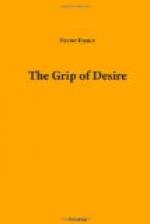—Stop that, Monsieur le Cure, interrupted Durand in a curt tone.
Marcel made a low bow, but as he withdraw, he caught an appealing look from Suzanne.
XXI.
THE PAST.
“Look not upon the past with grief, it will not come back; wisely improve the present, it is thine; and go onwards fearlessly and with a strong heart towards the mysterious future.”
LONGFELLOW (Hyperion).
Marcel returned home exceedingly indignant. Although he had not expected an over-cordial reception from the old Captain, whose irascible character and surly ways were known to all, he did not think that he would have carried so far his disregard of the most elementary propriety.
“It serves me right,” he said to himself, “what business had I there? Nevertheless, on reflection, I have lost nothing. My reception by this old dotard has taken away for ever my wish to go back there: and who knows what might have happened, if I had had free admission to that house, if I had met a friendly face and a kindly welcome? Oh, fool! I have found all that in the sweet look of his adorable daughter, that appealing look which seemed to implore my indulgence and pardon for the malevolent words of that ill-bred soldier. Come, think no more of it, drive back to the lowest depths those foolish thoughts which excite the brain. All that he does, God does well. I was on the brink of the abyss; one step more and I should have rolled to the bottom. Let me stop then, there is still time. Let me forget, forget. Forget! better still, I will write and ask to be changed. Could I forget her if I were to meet again that burning look, which pursues me to the steps of the altar, and troubles me to the bottom of my soul?”
He wrote in fact and began his letter ten times afresh. What could he say? What reason could he bring? He had filled this cure for scarcely six months. What pretext could he raise before his superiors? And how would any complaint from him be received at the Palace?
Night came. He felt himself oppressed by a vague and indefinable grief.
Then little by little the present vanished. His infancy rose up before him. He saw it again as in a glass, smiling, simple, pure; and he forgot himself in these sweet memories.
In proportion as we advance in life, we are attached to the things of the past. It clothes itself then with those brilliant colours with which we love to invest what we have lost. Youthful years, bright with poetry and sunlight, come and gild the gloomy and prosaic nooks of ripened age, the twilight of the eternal night.
The young man full of illusions and dreams pursues his road without casting a look backwards. What matters, indeed, the past to him? He expects nothing but from the future. Proud at having escaped from infancy, at arriving at the age of man, at flying on his wings, he pities the years when he was small and weak, ignorant and credulous.




